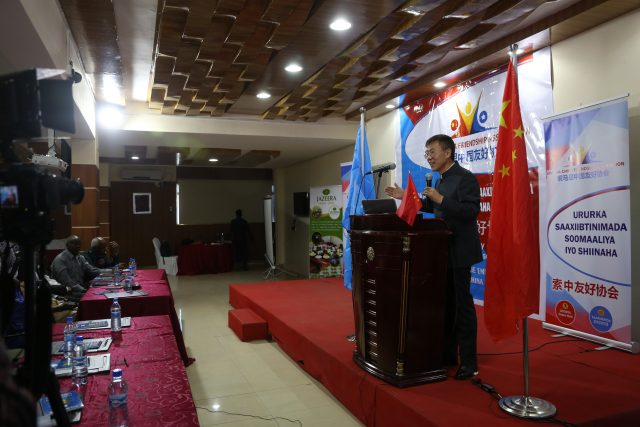
Opinions
11:08, 07-Aug-2018
The Belt and Road Initiative: win-win cooperation and common development
Updated
10:30, 10-Aug-2018
Qin Jian

Editor's note: The article was first published by the Somali National News Agency (SONNA) on Aug. 4, 2018. Qin Jian is the Chinese ambassador to Somalia.
In 2013, Chinese President Xi Jinping raised the Belt and Road Initiative (BRI), an important cooperation campaign that has achieved steady progress and fruitful results since its implementation. The international community has welcomed the BRI and its positive impact.
In fact, more than 100 countries and international organizations have joined this initiative, among which more than 50 have signed cooperation agreements with China, reaching a broad international consensus on the BRI.
The UN General Assembly, the UN Security Council, UNESCAP, APEC and ASEM have all incorporated or reflected the Belt and Road cooperation in their relevant resolutions and documents.

Chinese Ambassador to Somalia H.E. Qin Jian speaks at the founding of the Somali-China Friendship Association, July 28, 2018, in Mogadishu, Somalia. /SONNA Photo.
Chinese Ambassador to Somalia H.E. Qin Jian speaks at the founding of the Somali-China Friendship Association, July 28, 2018, in Mogadishu, Somalia. /SONNA Photo.
At present, the world economy is undergoing profound changes and faces challenges, especially under the impact of trade protectionism. By providing important opportunities and a platform for countries to deepen cooperation, the BRI has achieved positive outcomes and has the potential to deliver more benefits.
The BRI reaffirms China's commitment to building an open economy, ensures free and inclusive trade, opposes all forms of protectionism, endeavors to promote a universal, rule-based, open, non-discriminatory and equitable multilateral trading system with the WTO at its core.
The BRI stands for enhancing international cooperation through various development strategies, such as the 2030 Agenda for Sustainable Development and the African Union's Agenda 2063, advancing North-South, South-South, and triangular cooperation, expanding economic growth, trade and investment.
It upholds the spirit of peace, cooperation, openness, transparency, inclusiveness, equality, mutual learning, mutual benefit and mutual respect by strengthening cooperation on basis of extensive consultation and the rule of law.
The cooperation principles are consultation on an equal footing, mutual benefit, harmony and inclusiveness, market-based operation and balance and sustainability.
The goal of the BRI is to promote practical cooperation on roads, railways, ports, maritime and inland water transport, aviation, energy pipelines, electricity, fiber optics, information and communications technology, and welcome the development of an interconnected multimodal corridor.
It aims to strengthen cooperation on innovation by supporting action plans for e-commerce, digital economy, smart cities and science and technology parks, and by encouraging greater exchanges on innovative startup models in the Internet age, while respecting intellectual property rights.
The BRI endeavors to expand people-to-people exchanges, promote peace, justice, social cohesion, inclusiveness, democracy, good governance, the rule of law, human rights, gender equality and women empowerment.
It encourages people to work together to fight against corruption and bribery in all their forms, to be more responsive to the needs of those in vulnerable situations, to help improve global economic governance and ensure equal access to development opportunities and benefits.
The BRI accelerates environmental protection, sustainability and conservation, climate change reform and implementation of the Paris Agreement.
The initiative was proposed by China, yet it is not going to be China’s solo show. A better analogy would be that of a symphony performed by an orchestra composed of all participating countries.
The initiative upholds the joint endeavor on seeking complementarity and working for a globalization that is open, inclusive and beneficial to all.
Finally, promoting peace, mutually-beneficial cooperation and honoring the purpose and principles of the UN Charter and international law are shared responsibilities of mankind, as well as creating a prosperous and peaceful community with a shared future.

SITEMAP
Copyright © 2018 CGTN. Beijing ICP prepared NO.16065310-3
Copyright © 2018 CGTN. Beijing ICP prepared NO.16065310-3